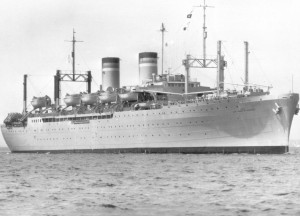The Buckner Banner
One of my first literary adventures was as editor of The Buckner Banner, the ship’s newspaper on the USNS Simon Bolivar Buckner, a troopship sailing from New York to Bremerhaven, Germany. It was 1963, and the U.S. Army was shipping me to Europe. Just out of technical school, I had one skinny little stripe on my sleeve. I must have been chosen as editor by some random process, as I had no experience. I guess that has always been the Army way. The Banner ran a news digest from the radio room every day, and had a lot of canned content used on every nine day voyage. My job was to come up with some original content. I had a crew of clerk typists who made mimeograph masters we ran off every morning. The most valuable thing I learned as editor is to listen to your people. One of the guys suggested we serialize a Sherlock Holmes novel. The passengers on the ship were a lot of GI’s headed to their first real duty station in Germany, stacked four deep in bunks in the cargo holds, and a large number of dependents, family members of career Army personnel. There were daily movies and a library, but little else for people to do. The Banner was a major defense against boredom. That Sherlock Holmes novel was a big hit. The mimeographed paper was hard to read. The machine was worn out, and the reproduction quality was terrible. We made no effort to make each paper entirely readable, so the passengers were forced to share their copies in order to be able to read every page. A detective novel became a shipboard community building event. People loved it, and I got a lot of compliments for someone else’s idea. I also had the run of the ship as the editor and got to explore the entire vessel, from the heads in the bow to the fantail. I was also exempt from all the nasty little jobs the Army gives troops to keep them busy. I was on the same ship on the way home, and knew all the places to hide. Mostly, the voyage was routine. There were stories about previous trips with bad weather. Those cargo holds full of troops had waves of vomit sloshing back and forth as the ship rolled and pitched. Then it had to be cleaned up. The most excitement we had was the lifeboat drill the first day out. The dependents lined up behind the lifeboats. All the GI’s in their life jackets lined up facing the water. We used to joke that part of the Army nomenclature for us was “expendable, non-returnable, with cover”. There have been some interruptions in my literary career, such as as the need to make a living, but the Army gave me a start.

Some interesting facts about Simon Bolivar Buckner’s meeting with General Grant during the surrender of Fort Donelson, TN. On the morning of February 16, 1862 Buckner sent a note to Grant requesting a truce and asking for terms of surrender. The note first reached General Smith, who exclaimed, “No terms to the damned Rebels!” When the note reached Grant, Smith urged him to offer no terms. Buckner had hoped that Grant would offer generous terms because of their earlier friendship. (In 1854 Grant was removed from command at a U.S. Army post in California, allegedly because of alcoholism. Buckner, a fellow U.S. Army officer at that time, loaned Grant money to return home to Illinois after Grant had been forced to resign his commission.) To Buckner’s dismay, Grant showed no mercy towards men he considered to be rebelling against the federal government. Grant’s brusque reply became one of the most famous quotes of the war, earning him the nickname of “Unconditional Surrender”.
Such a neat story Bill. This technique coul be good for blogging too
Very cool, Bill! So, the Army is where you first became a literary critic, eh? 🙂 Awe–I mean how exciting! I learned something new about you! Thanks for sharing.
Pingback: Sherlock | Bill's Views on Most Everything